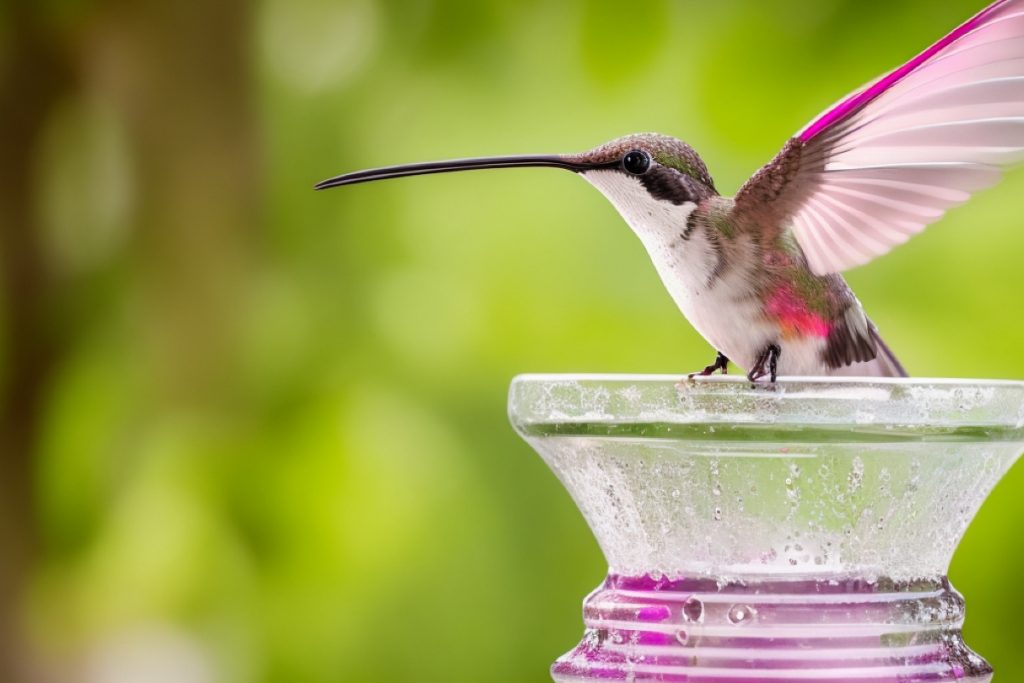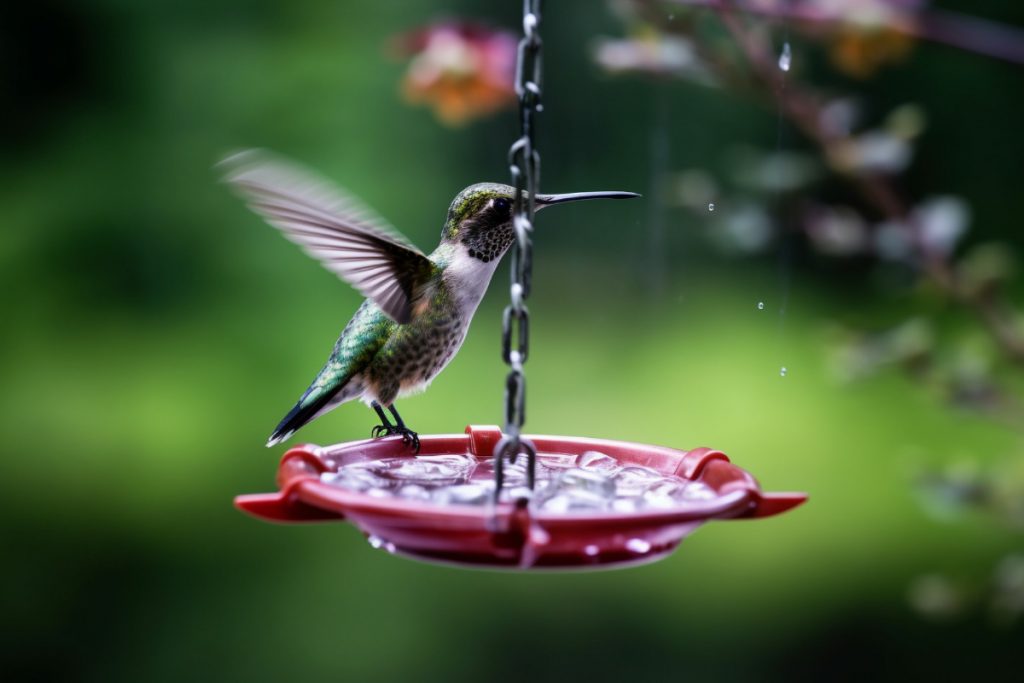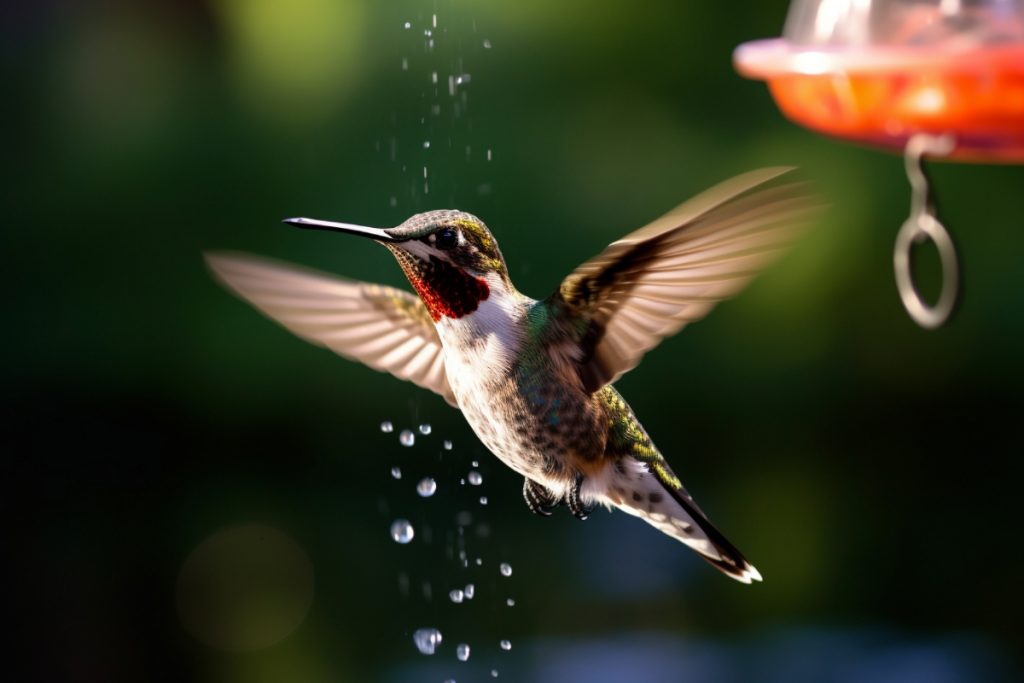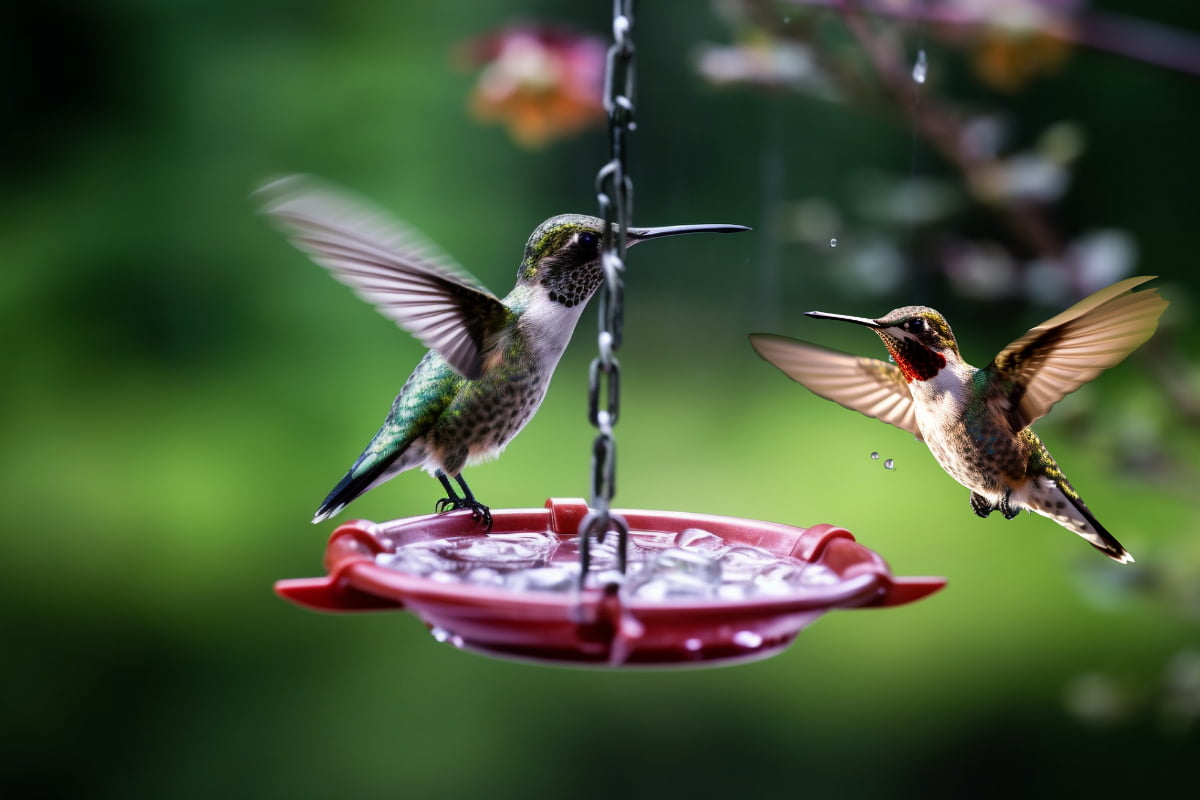Have you ever wondered if you can give hummingbirds cold sugar water solution? The short answer is yes; you can feed hummingbirds with cold sugar water solution. However, feeding them isn’t just about serving sugar water, cold or warm; there are some essential factors that you need to consider.
In this blog post, we will delve deeper into the complexities of feeding hummingbirds. Also, we will cover the essentials of hummingbird nutrition, the importance of temperature in their diet, the recipe for making safe sugar water for hummingbirds, and why keeping their feeders clean is so vital.
Key Takeaways
- Yes, You Can Feed Hummingbirds Cold Sugar Water: However, serving it at room temperature or lukewarm is preferable for the bird’s comfort and energy conservation.
- High Energy Needs: Hummingbirds have high metabolic rates requiring a sugar-rich diet, which can be supplemented with sugar water, especially during migration or colder periods.
- Temperature Matters: Cold sugar water could potentially use up more of hummingbirds’ energy reserves as their bodies work to heat up the water. Room temperature or lukewarm water is more agreeable to them.
- Safe Sugar Water Recipe: The sugar water should have a ratio of one part white granulated sugar to four parts water, resembling the sugar concentration in natural nectar. Avoid using honey, artificial sweeteners or dyed sugars.
- Clean Feeders Are Essential: The feeder should be cleaned every few days or daily in hot weather to prevent the growth of bacteria or mould that could harm hummingbirds.
- Responsible Feeding: Feeding hummingbirds involves ensuring their welfare by providing a safe and comfortable environment and understanding the impact of our actions on their survival.

Is It OK to Give Hummingbirds Cold Sugar Water?
Yes, it is ok to give hummingbirds cold sugar water solution. However, room temperature or slightly warm sugar water is better for their comfort and energy conservation. Cold sugar water can use up more of a hummingbird’s energy reserves as their bodies work to warm the water.
Therefore, while a cold sugar water solution won’t harm hummingbirds, providing it at room temperature or lukewarm offers a more suitable option.
The Energy Needs of a Hummingbird
A hummingbird’s energy requirement is staggering. Their high metabolism, fuelled by their rapid wing-flapping, requires a diet rich in sugars.
- Nectar: Hummingbirds primarily rely on flower nectar, which is high in sugar content. They can visit up to 2,000 flowers per day to meet their energy needs.
- Sugar Water: In addition to nectar, hummingbirds can benefit from supplemental feeding, especially during migration or in cold temperatures. This is where sugar water comes into play. It mimics the natural nectar that hummingbirds feed on, providing them with the much-needed Energy to survive.

The Importance of Temperature in a Hummingbird’s Diet
Believe it or not, the temperature of the sugar water you offer hummingbirds matters. While they can drink cold sugar water, room temperature or lukewarm sugar water is preferable. Here’s why:
- Body Temperature Maintenance: The high metabolic rate of hummingbirds means they burn calories quickly. Thus, maintaining their body temperature is crucial. Drinking cold water could potentially use up more of their energy reserves as their bodies work to heat up the water.
- Comfort: Like us, hummingbirds prefer comfort. Drinking cold water in chilly weather isn’t exactly pleasant, even for these tiny creatures. Room-temperature sugar water provides a more agreeable meal for them.
Recipe for Safe Sugar Water for Hummingbirds
It’s not enough to just give hummingbirds any old sugar water. You must prepare it in a way that closely replicates its natural nectar.
Ratio: Use a ratio of one part white granulated sugar to four parts water. This ratio approximates the sugar concentration found in most flower nectars. Avoid using honey, artificial sweeteners, or dyed sugars, as they can be harmful to hummingbirds.
Preparation: Dissolve the sugar in water by stirring it until it’s clear. There’s no need to boil the water, but doing so can help dissolve the sugar more easily and kill any bacteria or fungi in the water. If you do boil it, ensure the water is cooled before serving.
Storage: If you have any leftover sugar water, it can be stored in the refrigerator for up to a week.
The Importance of Clean Feeders
The feeder you use to provide the sugar water to hummingbirds must be kept clean.
- Health Hazards: Sugar water, especially in warm weather, can quickly become a breeding ground for bacteria and mould. Consuming tainted sugar water can lead to serious health issues for hummingbirds, such as fungal infections or fatal metabolic disorders.
- Cleaning Schedule: It’s recommended to clean the feeder thoroughly every few days or daily in hot weather. Use a solution of one part white vinegar to four parts water, then rinse thoroughly. Avoid using soap or detergents, as these can leave harmful residues.

Final Thoughts
Feeding hummingbirds can be a truly rewarding experience. By understanding their needs and ensuring they have access to healthy, safe sugar water, you can enjoy their company whilst contributing to their survival.
Remember, while they can consume cold sugar water, offering it at room temperature or lukewarm can make a significant difference to their comfort and energy conservation.
Generally, feeding hummingbirds is much more than just providing a makeshift meal; it’s a delicate dance with nature, an opportunity to contribute to the preservation of these magnificent creatures. Each time you prepare that sugar solution, remember the ripple effect your actions have. You are providing a lifeline, especially in areas or times when natural nectar sources may be scarce. Yet, as with any interaction with wildlife, it must be done responsibly, with their welfare at the heart of our actions.
So, what next?
The hummingbird, a marvel of nature with its iridescent plumage and blur of wings, has much to teach us. Its relentless quest for nectar, fuelled by a metabolism like no other, serves as a reminder of the tenacity of life.
As we watch them flit from feeder to flower, let’s not forget our role in their survival story. When we ask, “Can you give hummingbirds cold sugar water?”, perhaps what we’re truly questioning is our place in their narrative and how best we can support them.
Related Posts to Read:
References:
- About Hummingbird (Link).
- Smithsonian’s National Zoo & Conservation Biology Institute. (Link).
- Greenewalt, C. H. (1960). Hummingbirds. New York: Doubleday. Google Scholar.

I loved reading your article. Very informative. I have 3-4 feeders going all year. There’s always w or 3 and this summer I had at least 15 lil cuties flying back and forth
Hello Leslie,
Thank you so much for your kind words! It warms my heart to hear about your experience with the hummingbirds. Having 15 of those little beauties buzzing around must be such a delightful sight! Continue enjoying their company, and thank you for creating such a welcoming environment for them. Keep up the great work with your feeders!
Warm wishes.
I saw a regular bird feeding along with my hummingburds will this harm the hummers?
Hi Bel.
It’s actually quite common to see a regular bird hanging out at a hummingbird feeder, and it shouldn’t cause any trouble for the hummers. However, hummingbirds can be a bit territorial, so they may swoop around or even chase off other birds they see as rivals. Just be sure the larger birds aren’t depleting the nectar too quickly or preventing the hummingbirds from accessing the feeder. If it becomes a recurrent issue, consider setting up a separate feeder for the regular birds away from the hummingbird feeder. That way, everyone can enjoy their share peacefully. Thanks.
John.
I love our resident Hummers and I warm the nectar to room temperature. I have about 8 feeders and about 4 regular visitors. ” Smith Corona” the resident Anna is VERY TERRITORIAL 😂 He owns all of the feeders and the fountain too.
Hello Cynthia,
Thanks for sharing this delightful glimpse into your hummingbird world. Here’s to many more enjoyable birdwatching moments!
Happy birdwatching!
Whose room temperature? Mine or the bird’s? Does this mean it’s bad for hummingbirds to drink natural sources of nectar if it’s cold old? Hmmm.
Hi Steve,
When we talk about ‘room temperature’ for hummingbird feeders, we’re referring to human room temperature, generally around 68-72°F. This ensures the sugar water is comfortable for the birds and not too hot or cold.
Regarding your second question, it’s totally fine for hummingbirds to drink natural nectar even when it’s cold outside. Unlike our prepared sugar water, natural nectar won’t be ice-cold, so it’s safe for them to drink it in various weather conditions.
I hope that clears things up.